- 1Select Items
- 2Delivery Options
- 3Name & Address
- 4Further Details
- 5Discounts
- 6Payment
Shakespeare In Love (15)
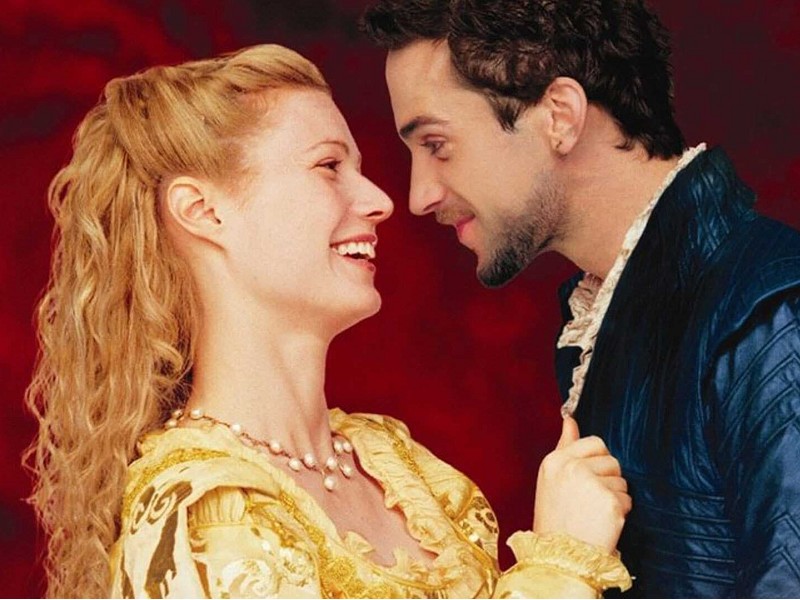
Book Tickets
|
John Madden’s 1999 Best Picture winner remains a sparkling mix of romance, comedy, and backstage theatre magic.
In 1590s London, William Shakespeare (Joseph Fiennes) struggles to finish a new play while wrestling with writer’s block. His world changes when he meets Viola de Lesseps (Gwyneth Paltrow), a spirited noblewoman who dreams of performing on stage, even if it means disguising herself as a man. Their secret romance ignites Shakespeare’s creativity, but rival theatres, strict censorship, and jealous suitors threaten to pull them apart just as the play is set to debut.
Fiennes captures Shakespeare’s mix of charm, insecurity, and passion, while Paltrow lights up the screen with wit, courage, and undeniable chemistry. Geoffrey Rush, Judi Dench and Tom Wilkinson add comic sparkle. Clever wordplay, sly humour, and playful nods to Shakespeare’s later works keep both the romance and the behind-the-scenes drama lively and engaging.
Funny and full of theatrical flourish, Shakespeare in Love has cemented itself as a nineties classic. It’s the perfect storm. Literate without being pretentious, bawdy without being gross and grounded in historical fact without being constricted by it. And it’s a joy to revisit.
The SpongeBob SquarePants Movie: Search for SquarePants (PG)
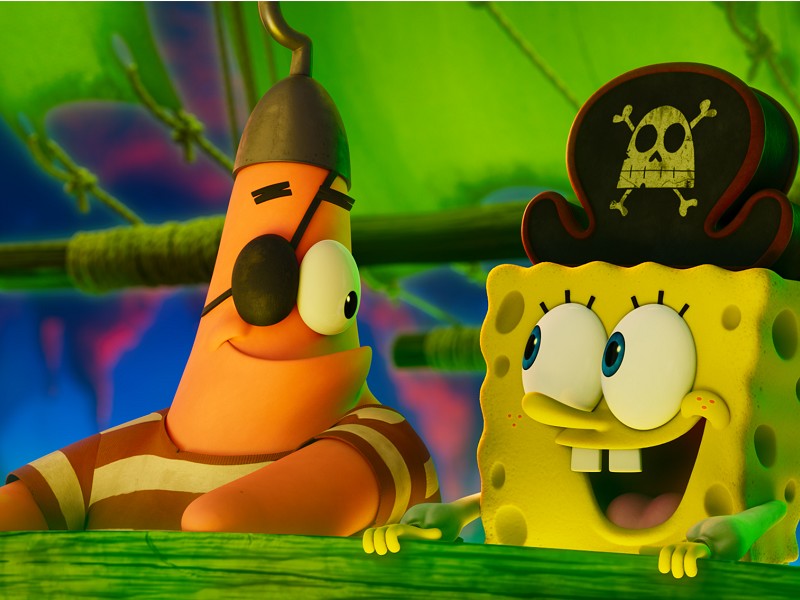
Book Tickets
|
Roughly every five years, a new SpongeBob comes along and inflicts another hallucinatory, surreal adventure on children and their unwary cinemagoing parents.
SpongeBob (Tom Kenny) is now 36 clams high, a source of particular excitement as this will allow him to ride the rollercoaster of his dreams. SB’s quest to obtain the fabled swashbuckler certificate that will prove him a “big guy”.
To that end, he and his bestie Patrick (Bill Fagerbakke) blow an enchanted horn to summon the Flying Dutchman (Mark Hamill), and learn how to be swashbuckling pirates. Alas, the cursed pirate plans to double-cross them and use their quest to undo his own gloomy fate. But first he’ll be driven barmy by their good-natured attempts to help him out, and their blithe knack for surviving the underworld to which he consigns them.
Snicker-inducing silliness ensues with the series’ trademark bizarre humour that will have some parents howling, and others utterly exhausted; either way, the kids will adore it. Whether its daftness will linger when the lights come up is debatable, but it’s a solid SpongeBob film through and through.
Marty Supreme (15)

Book Tickets
|
Josh Safdie’s solo venture delivers a bruising, propulsive portrait of ambition.
Set in the early 1950s and loosely inspired by table-tennis icon Marty Reisman, Safide uses the world of competitive ping-pong as a springboard into a sharper study of American identity, class, and self-invention, built around a Oscar-hungry performance from Timothée Chalamet.
Marty’s rise begins with a breakout showing at the British Open, but his sights are set firmly on the World Championship in Tokyo. Getting there requires ingenuity of the least noble variety: hustling, grifting, and even a dog-napping that spirals into a wonderfully chaotic subplot. The result is a portrait of a man whose talent is matched only by his capacity for self-sabotage. His entanglements with Rachel, a childhood friend now trapped in a mess he refuses to acknowledge, and Kay, a faded Hollywood star married to the very tycoon Marty hopes will bankroll him, sharpen the film’s critique of charm weaponised as survival. Chalamet makes Marty both magnetic and exasperating, sustaining a performance of coiled energy.
The momentum never flags, and as Marty barrels toward Tokyo, Safdie crafts a character study as combustible as its antihero. It’s volatile, gripping, and impossible to look away from
Now You See Me, Now You Don't (12A)
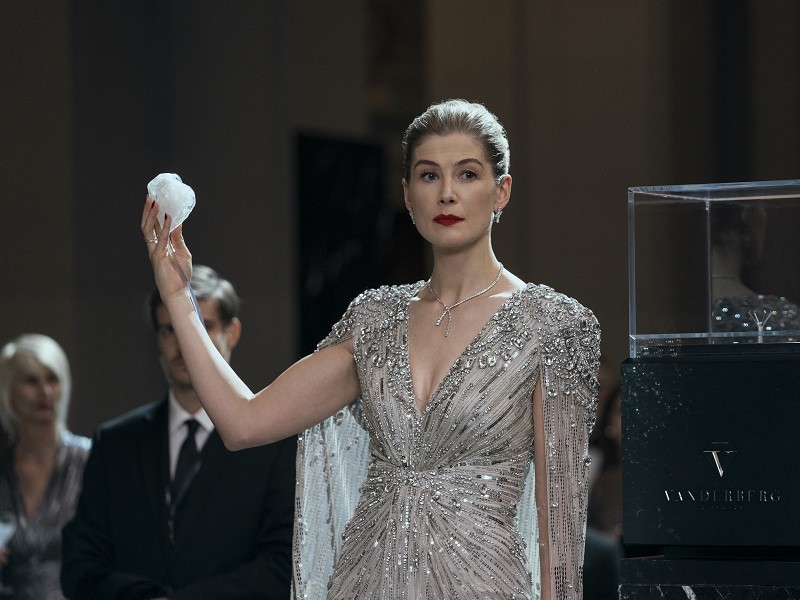
Book Tickets
|
Nearly a decade on from the last film, the Four Horsemen — whose numbers now swell to five or even eight — are back.
Atlas (Jesse Eisenberg) and his super-pals return — including pork-pie-hat-wearing hypnotist Merritt McKinney (Woody Harrelson), assistant-turned-escape artist Henley Reeves (Isla Fisher), and sleight-of-hand trickster Jack Wilder (Dave Franco), dispatching baddies with well-thrown cards.
But the quartet are tricked into a testy reunion when a message from The Eye brings Atlas to the doorstep of a younger trio of similarly gifted magicians: Their task: steal an enormous diamond from money-laundering arms dealer Veronika Vanderberg (Rosamund Pike), a mission mostly in sync with the new kids’ proclivity for wealth redistribution, albeit more neatly traditional in its choice of evildoer.
The charmingly silly idea of magicians using their illusions to pull off elaborate heists has now overblown into Fast & Furious style levels of ludicrousness. Thankfully, the actors seem specifically delighted to be in a series that doesn’t require a lot of fake gravitas, just straight-enough faces when someone chimes that in these troubling times, we need magic more than ever.
Roofman (15)
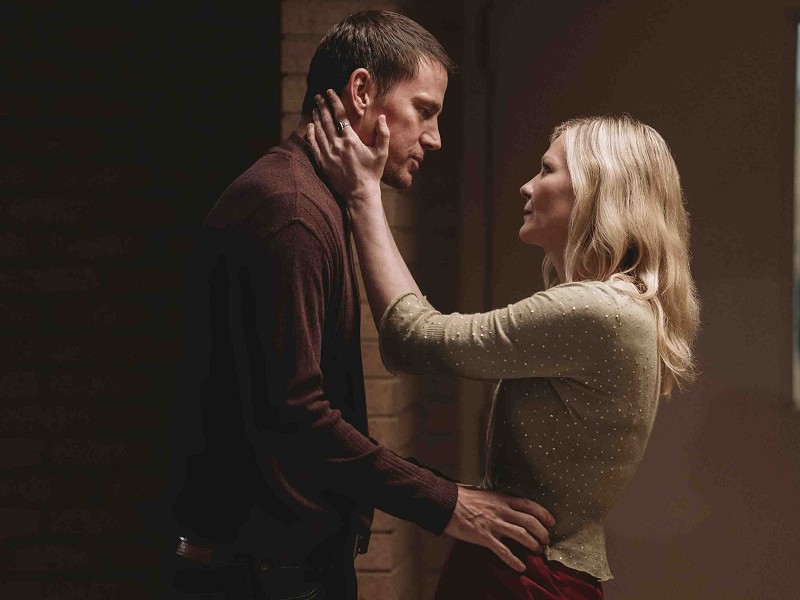
Book Tickets
|
Channing Tatum and Kirsten Dunst’s chemistry sweetens a romance tinted with melancholy in this fun, true-crime caper.
It’s based on the real tale of Jeffrey Manchester (Tatum), an ex-military father who can’t quite find his place in the world. His army buddy Steve (Lakeith Stanfield) reminds him of his skill for observation, urging him to put it to good use. Instead, he decides to use it to rob not one but 45 McDonald’s, enough to give his family the life they deserve. The real stranger-than-fiction part is the ingenious way he escaped from the correctional facility and managed to live undetected for months in the hidden spaces of a Toys “R” Us.
He first hides in the roof, before making his way down and holing up in an unseen section of the store, snacking on M&Ms and spying on the staff (headed up by Peter Dinklage). One of them is Leigh (Dunst), a single mother he can’t stop himself from helping, a slippery slope that sees him craft a fake identity, getting himself into deeper and deeper trouble. Roofman is both funny and affecting. Don’t miss.
A Knights Tale (PG)
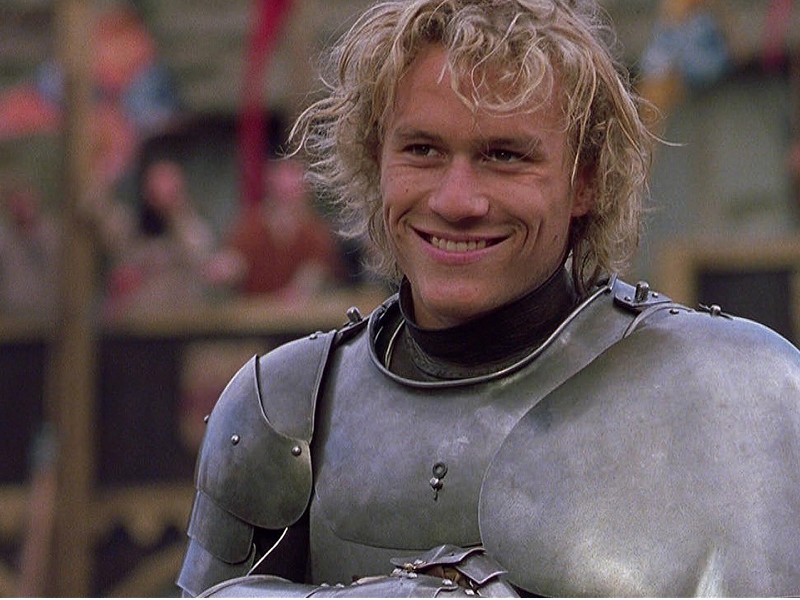
Book Tickets
|
The late, great Heath Ledger and his luxurious blond curls take centre stage in this wonderfully silly yet uplifting medieval romp.
William Thatcher (Ledger) is a squire to a knight found dead minutes before he’s due for a jousting tournament. It’s the 1370s, and only people of noble birth can compete – but William convinces his fellow squires, the sensible Roland (Mark Addy) and the volatile Wat (Alan Tudyk) that he should take their dead master’s place.
William wins the joust and persuades Wat and Roland to keep up the ruse. With the help of Paul Bettany’s Chaucer, William becomes the fake knight Sir Ulrich von Liechtenstein, and jousts his way to the World Championships. There’s a damsel too, in the shape of Jocelyn (Shannyn Sossamon). But Count Adhemar (Rufus Sewell) also wants Jocelyn – and he’s the knight to beat in the ring.
The film on paper is absurd. It’s a medieval sports film, filmed on cheapo sets in post-Velvet Revolution Prague to a rock soundtrack. Is it authentic? Probably not. But it is a film so full of heart it’s the only thing that’ll do when you need to watch something uncomplicatedly lovely.
Song Sung Blue (12A)

Book Tickets
Craig Brewer’s drama strikes a heartfelt chord, turning the true story of a husband-and-wife Neil Diamond tribute band into a warm, quietly affecting crowd-pleaser.
Set in the mid-1990s, it follows Milwaukee single dad Mike (Hugh Jackman) and single mother Claire (Kate Hudson), two restless dreamers who can’t write songs of their own but find solace and eventually love in the music of Neil Diamond. Persuaded by Mike’s infectious enthusiasm, they form the cover band Lightning & Thunder, blending their families as quickly as they blend harmonies. Their live shows take off, their bond deepens, and for a while life feels electric, until tragedy threatens to break everything they have built.
Jackman belts Diamond’s classics with a swagger while Hudson offers a tender, melodic counterpoint, and together they create a duet built on bruised hearts and big hope. Brewer recreates the era with flair. Glittering costumes, lovingly scuffed venues and fluid camera work capture both the joy of their performances and the shadows creeping in around them.
Moving, tuneful and gently uplifting, this is a charming human tale that will likely send everyone who watches searching for the real couple and the documentary that first told their remarkable story.
Brubaker (15)
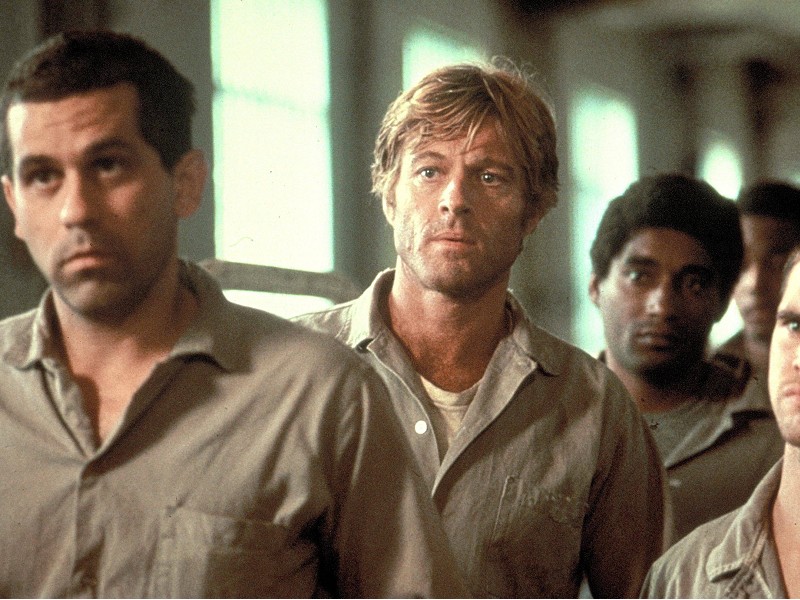
Book Tickets
|
If The Shawshank Redemption is the doleful labrador of prison films, then Brubaker, starring a gutsy, convincing Robert Redford, is the snarling bulldog.
Henry Brubaker (Redford), Wakefield State Prison’s new warden, has heard all the rumours about unsafe conditions and rampant mismanagement. The food and cells are abominable; prisoners are tortured and used as slave labor for local businessmen. So to get a good sense of where his priorities should lie, he masquerades as a prisoner ahead of his first day. He keeps himself inconspicuous, and watches as the rumours prove themselves not just true but worse than he possibly could have conceived.
Several key prisoners are wary of Brubaker's reformist zeal. An inmate guard (Yaphet Kotto) retains a "show-me" attitude, and a lifer (David Keith) finds it difficult to believe that any warden could care about the dignity of convicts. Eventually they both are won over.
Craftily well-directed by Stuart Rosenberg (The Amityville Horror), Brubaker is granite-hard and, despite the odd drift into impassioned cliché, truly gripping. This muck-rake through America's infected soul could be viewed as one of the last hurrahs of the '70s.
No Other Choice (15)
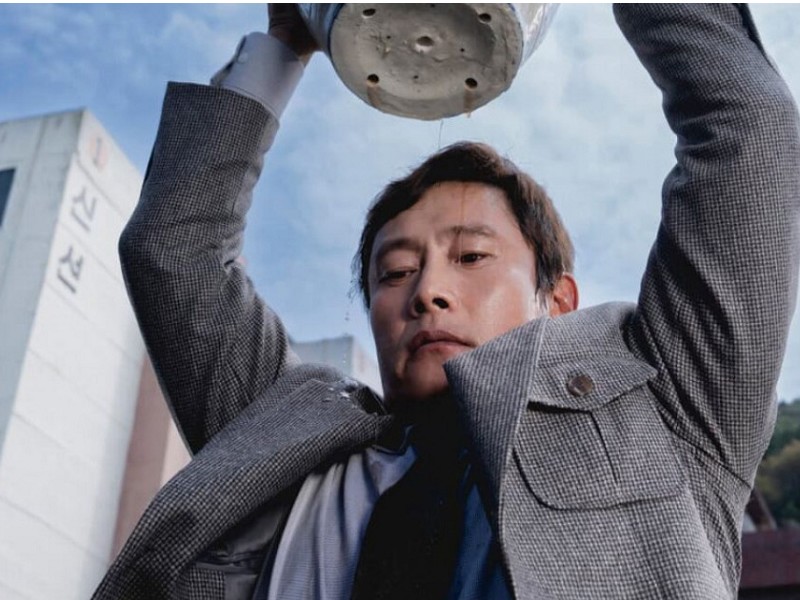
(Subtitled)
Language: Korean
Master filmmaker Park Chan-wook returns with another delicious slice of nation satire, as Lee Byung-hun plots to bump off the competition.
Byung-hun is family man You Man-su, who lives in a gorgeous home with his wife Miri (Son Ye-jin), their children Si-One and Ri-One, and two beautiful dogs. Man-su is devastated after being laid off from his paper company management role after 25 years, and despite assurances from his wife he’ll find a new job soon, 13 months later he’s stacking boxes in a warehouse.
After a series of calamities, with house foreclosure pending, Man-su becomes truly desperate, and after becoming mildly obsessed with the cool middle manager at Moon Paper, realises the job market is simply too competitive. Wouldn’t it be easier if, let’s say, he thinned out the herd? Yet Man-su isn’t as cut-throat as he fancies himself, and his murder plot isn’t particularly thought out.
Parallels to Bong Joon-ho’s Parasite are understandable, but this easy comparison undermines the specificity of both films. While the two directors are peers with shared interests, and there is undoubtedly some common DNA, No Other Choice boldly confronts erasure of our humanity as we’re homogenised by capitalism.
H is For Hawk (12A)
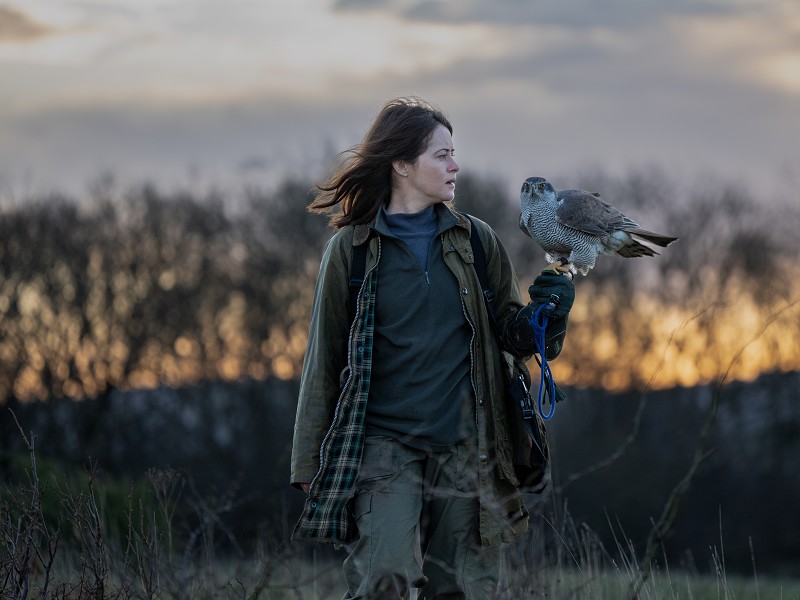
Book Tickets
Claire Foy leads this thoughtful adaptation of Helen Macdonald’s memoir.
Helen is a young academic whose life is upended by the sudden death of her father, a celebrated photojournalist and her closest companion. Struggling to process the loss, she impulsively buys a goshawk, Mabel, retreating from the world to train the bird in the countryside. The demanding routines of falconry, full of risk, discipline, and frustration, become a way for Helen to channel her grief, even as they isolate her further from friends and family.
Grief is turned into something quietly tangible, blending personal loss with an unexpected bond between human and animal. Warm but restrained, it finds meaning not in grand statements but in patient observation.
Claire Foy gives a finely tuned performance, capturing Helen’s inward spiral with sensitivity and control. Her scenes with Brendan Gleeson, seen in affectionate flashbacks, establish a deep emotional foundation that makes the loss keenly felt. The falcon itself becomes a striking presence, filmed with care and respect, neither sentimentalised nor simplified.
While a few scenes lean toward conventional drama, the film is strongest when it embraces uncertainty. Quiet, observant, and occasionally untidy, it reflects grief as something lived through rather than resolved.
Hamnet (12A)
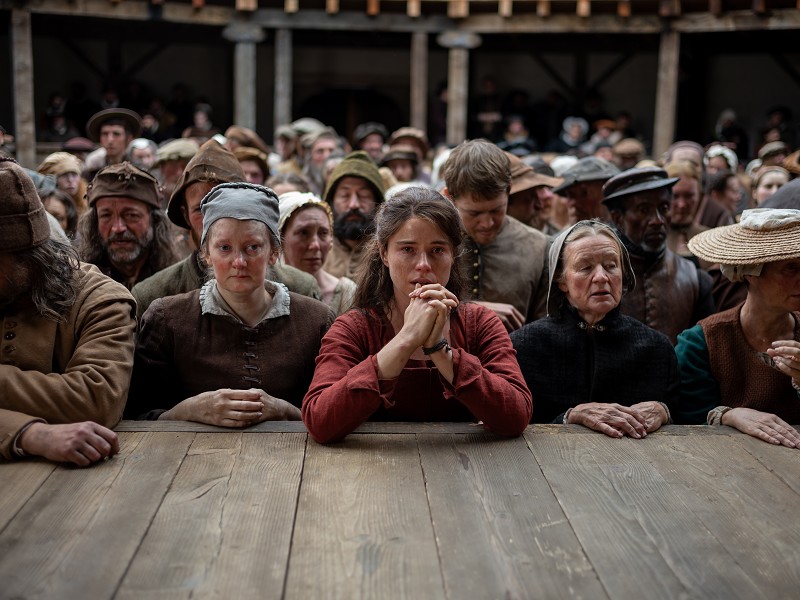
Book Tickets
Chloé Zhao offers an intimate take on the human story behind Shakespeare’s family in this stunning portrait of love, loss and endurance.
Agnes, a perceptive young woman with a deep connection to the land, is viewed with suspicion by her neighbours but forms an immediate bond with Will, a visiting tutor. Their relationship quickly becomes a marriage, and soon a growing family follows. While Will increasingly divides his time between home and London, Agnes holds the household together with the help of relatives. That fragile stability is tested when sudden illness strikes during one of Will’s absences, leaving Agnes to face the consequences alone.
Adapted from Maggie O’Farrell’s novel, the film is rooted in the textures of the natural world. Everything moves to its own patient rhythms, drawing power from everyday rituals and emotional undercurrents. Jessie Buckley gives a career-defining performance, capturing Agnes’s strength and vulnerability in devastating fashion. Paul Mescal complements perfectly, portraying Will as loving but distracted by ambition. Their chemistry makes the early warmth of the relationship feel genuine, which deepens the impact when tragedy arrives.
A moving, measured and quietly devastating reflection on how creation can ultimately emerge from intense sorrow.
Sisu: Road To Revenge (15)

Book Tickets
|
This riotously over-the-top sequel doubles down on the savage, tongue-in-cheek mayhem that made the original a cult favourite.
Jorma Tommila returns as Aatami, the silent, unstoppable embodiment of “sisu”, that uniquely Finnish brand of grim, heroic resilience.
It’s 1946, the war is over, and Aatami heads home to Karelia to recover the remnants of his old life. But crossing into Soviet territory puts him in the sights of a ruthless KGB official, who unleashes the brutal commander Igor (Jack Doolan Lang) to finish what the Nazis couldn’t. For Aatami, the hunt becomes personal, offering a long-delayed chance to avenge his murdered family. What follows is a bone-crunching gauntlet of carnage as he tears through his enemies with whatever weapons or improvised tools he can get his hands on.
Characters remain stripped to essentials. Aatami’s stoic resolve versus Igor’s sneering bravado. Tommila’s wordless performance carries surprising weight, while the practical gore effects give every fight a gruesomely tactile punch.
Lean, relentless and gleefully absurd, this delivers exactly what’s needed. Brisk pacing, inventive brutality and a revenge tale so simple and ferocious it circles all the way back to being oddly satisfying
It Was Just An Accident (12A)

Book Tickets
|
(Subtitled)
Language: Persian
Iranian filmmaker Jafar Panahi’s Palme d’Or-winner is a finely calibrated thriller exploring the high price of revenge on a potentially evil man.
A man (Ebrahim Azizi) is driving at night with his pregnant wife and daughter in the car and suffers the time-old shock-premise of hitting something in the darkness: a dog. This simple accident causes his car to break down, and he finds himself pulling over at a garage belonging to Vahid (Vahid Mobasseri).
The driver has a disability too, a limp, and Vahid is stunned, scared and angry to realise that he knows this man; and it sets in motion bizarre a series of events that reunites a disparate cohort of Vahid’s acquaintances who have all suffered at the hands of the state.
It’s a beautifully executed film, one of Panahi’s most powerful, gripping and generous. As the clock ticks on and the van fills up with folks from all walks of life who also want their pound of flesh, the messiness of life makes itself felt and the simple task at hand becomes more complex as a broader picture of their captor emerges.
Kangaroo (PG)

Book Tickets
|
This adorable children’s film, set in the Land of Down Under, gets a little cheesy – but it’s also full of very cute kangaroos, making it hard to dislike.
Chris Masterman (Ryan Corr) is the local weather reporter for Rise and Shine Australia, and no one takes him seriously. Chris is going to change that when the opportunity to go viral presents itself. Unfortunately, it blows up in his face and gets him fired. He has one shot to get his career back on track, and that is to drive to Broome and do some regional work. But when his car accidentally hits a kangaroo on the way, he is stuck in a small town waiting for his car to be fixed, but also looking after a now orphaned joey. He tries to offload the cute little thing, but soon realises he’s its only chance.
His path intersects with Charlie (Lily Whiteley), a sweet-natured Indigenous girl who embodies the film’s optimistic spirit. It’s nice to see a film in which caring for animals is the point, rather than having them used to pursue particular narrative goals. Charming fun for all ages.
Paul McCartney: Man On The Run (15)
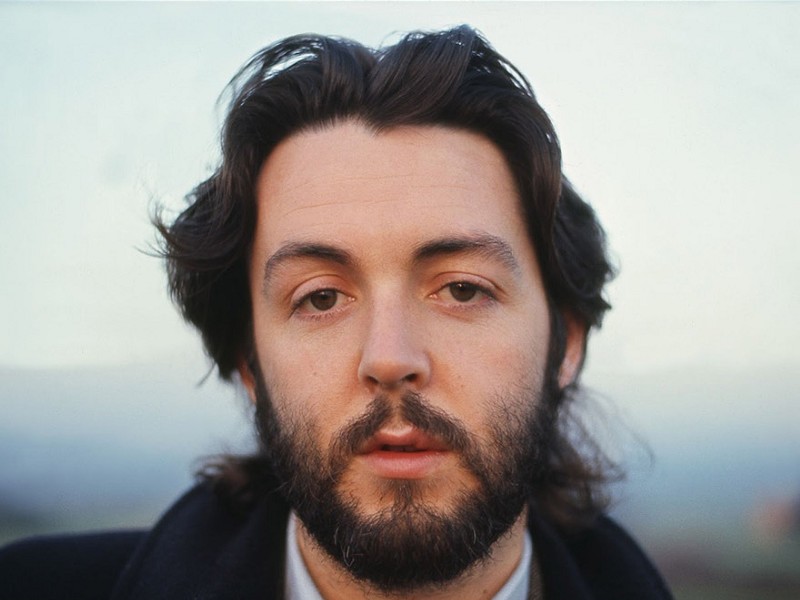
Book Tickets
|
This energetic, revealing documentary digs into one of pop’s most fascinating reinvention stories, following Paul McCartney as he tries to outrun the shadow of the Beatles and figure out who he is next.
Director Morgan Neville focuses on the turbulent 1970s, beginning with the band’s breakup and tracing McCartney’s uncertain early solo years through to the formation, rise and eventual fracturing of Wings. Newly unearthed archive footage places us inside a period of doubt and determination, from low-key family life with Linda and their children in rural Scotland to chaotic tours, shifting line-ups and unexpected chart triumphs. Along the way, McCartney reflects candidly on creative risk, bruised confidence and the challenge of stepping out from a once-democratic band into an unquestioned leadership role.
Hit-packed musical sequences are balanced with quieter, more vulnerable moments, letting McCartney’s own words shape the story. Former collaborators are given space to offer differing perspectives on Wings, not all of them flattering, which adds welcome texture. The film also approaches the death of John Lennon with sensitivity, thoughtfully contextualising McCartney’s famously misread reaction through fresh testimony.
Intimate without being reverent, it’s an engaging portrait of an artist starting over and finding new freedom along the way.